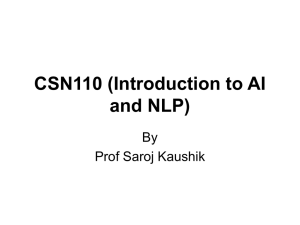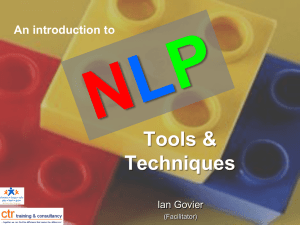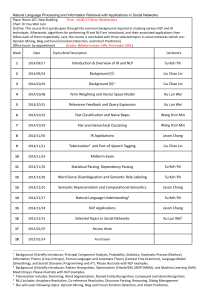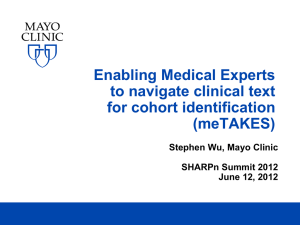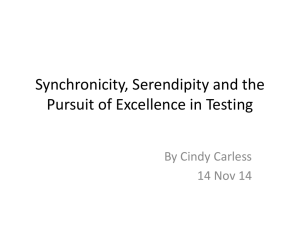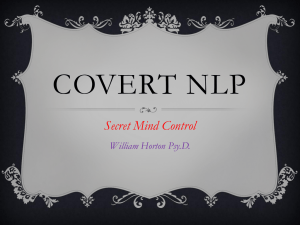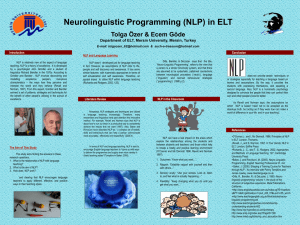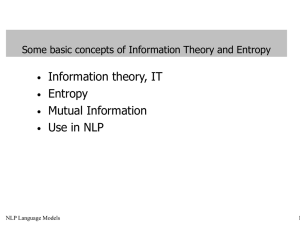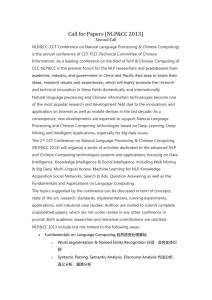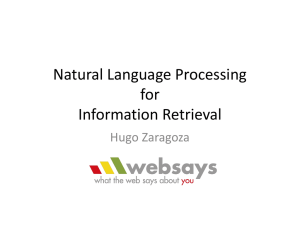to our PowerPoint presentation introducing NLP
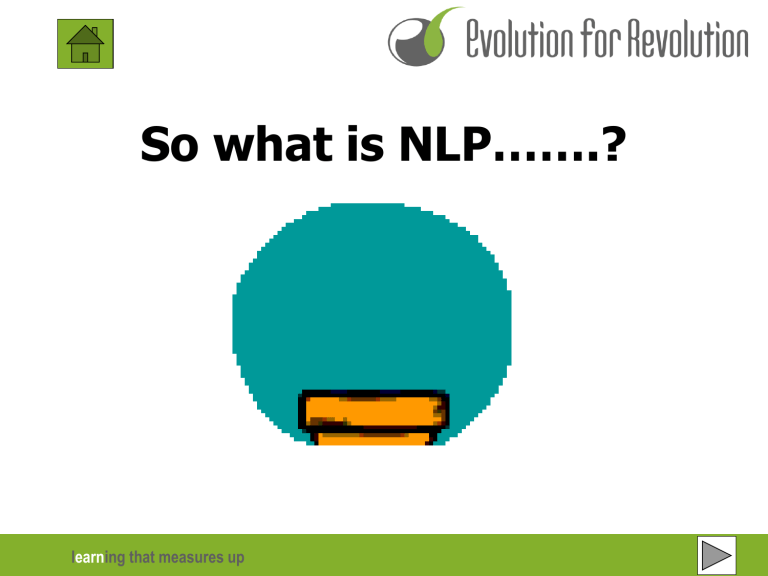
So what is NLP…….?
l earn ing that measures up
Introduction:
So what is NLP…..?
One definition states that “ NLP is the study of the structure of subjective experience.”
Right! So let me repeat my question; What is NLP…..?
N
L
P
Neuro
Refers to the mind and how we organise our thoughts and mental life.
Linguistic
Programming
Is about language, how we use it and how it affects us.
That is the language we use to describe and categorise our world, and make sense of our experiences.
Is about our sequences of repetitive behaviour, patterns of thought and how they help or hinder us.
2 of 6 l earn ing that measures up
How to fulfil your curiosity:
To ensure your enjoyment and engagement this taster has been written using a conversational style.
As we live by our ‘evolution for revolution’ ethos we would very much welcome your feedback on this taster.
Please let us have any comments via our
‘contact us’ page on this website.
To navigate your way around, use the following buttons:
Takes you back to the beginning
Next Screen
Previous screen l earn ing that measures up
Background to NLP
For those of us who like to check out credentials, here goes, for everyone else click next to continue
Neuro Linguistic Programming began in the early ’70s when Richard Bandler, a student of psychology at the University of California, Santa Cruz started working with John Grinder, who was then the Assistant Professor of Linguistics.
They began by studying three people to find out how and why they were such successful experts in their field.
Fritz Perls, (no not Cracker!) the innovative psychologist and originator of Gestalt therapy;
Virginia Satir, the prime force behind family therapy, and;
Milton Erickson, the world famous hypnotherapist.
As a result of these studies the first strategies and models of excellence they identified dealt with verbal and non-verbal communication skills.
Subsequently NLP has identified a myriad of techniques that are used successfully in all walks of life and for many different purposes, such as coaching, sales, marketing, self development, influencing and many more.
2 of 6 l earn ing that measures up
NLP and You
So what can NLP do for me…?
The starting point of NLP is curiosity and fascination about people, including yourself!
NLP curiosity gives rise to questions such as…… l earn ing that measures up
Curiosity……..click me!
2 of 6
NLP and You
How do we do what we do?
How do successful people do it?
What works?
How do we think?
How do we learn?
How do you do that?
How do we get angry?
What is the difference that makes the difference?
What do I want?
How do we get happy?
2 of 6 l earn ing that measures up
NLP and Beliefs
What we believe deeply affects what we think, how we act and react.
Many an argument can be on whether a belief is right or wrong, however NLP sees beliefs in terms of helpful and not helpful.
As a result of your beliefs:
What do you do?
How do you act?
How do you translate what you see?
How do you translate what you hear?
As we can’t possibly know everything about everything……really……many of our beliefs are our best guess at the time.
Get curious……..what are your beliefs and how do they serve you?
2 of 6 l earn ing that measures up
The Four Legs of NLP
Rapport
Outcome
Orientation
Click each box to find out more……..
l earn ing that measures up
Sensory
Acuity
Behavioural
Flexibility
2 of 6
The Four Legs of NLP
Rapport
Generally being in rapport with someone, is about getting on with them.
But in NLP it is much more than this.
Rapport:
Is the first step to good communication
Is meeting others in their model of the world
Is matching the way you communicate to the way the other person takes in information
Increases the likelihood that the message you send will be the one they receive
Promotes trust and comfort between people
2 of 6 l earn ing that measures up
The Four Legs of NLP
Outcome
Orientation
The second leg is to know what you want. Without knowing what you want you cannot define success, celebrate when you achieve, or map your journey towards your goals.
You need to ask yourself the following questions:
What do I want?
What do I want?
What do I want?
What do I want ?
l earn ing that measures up
2 of 6
The Four Legs of NLP
Sensory
Acuity
The third leg is to notice what is happening to you and to others around you. Become more curious and aware of the effects and impact of what you do. Only then will you truly know if you are on course to achieve your goal. You can then use this feedback to adjust what you are doing.
You need to ask yourself the following questions:
How will I know when I have got it?
What will I be seeing when I have got it?
What will I be hearing when I have got it?
What will I be feeling when I have got it?
What will you see me doing, when I have got it?
What will you hear me saying when I have got it?
2 of 6 l earn ing that measures up
The Four Legs of NLP
Behavioural
Flexibility
If what you are doing isn’t working do something different.
If you always do what you’ve always done, you will always get what you’ve always got
Remember, you always have a choice of what action you take and how you act and react to situations. It is useful to look at the world from different perspectives and points of view. The more behavioural flexibility you have the more choices you will discover.
Keep changing what you do until you get what you want
2 of 6 l earn ing that measures up
Your next steps…?
If you want to unlock your potential you need to get curious about what is inside!!
l earn ing that measures up
2 of 6
